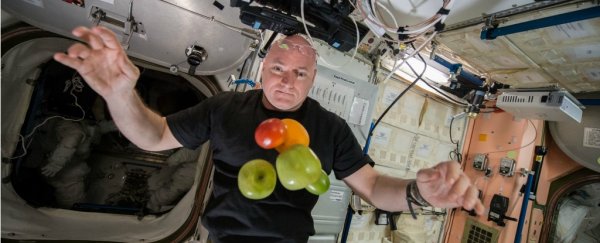Three months after returning to Earth, Astronaut Scott Kelly is still feeling the effects of his year in space. Speaking at a NASA event answering questions about his mission, Kelly described how the length of his flights determined how bad he felt after landing.
His first two missions were short seven and 13 day-stays, while this 340-day mission was much longer than his third at 159 days. "This flight was twice as long and I felt twice as bad," he told the crowd.
He continued:
"After I got back, I've talked about just being really sore and stiff. My skin had not touched anything in 340 days except just your clothing. Anything it touched, it felt like it was on fire. I actually had some rashes and kind of discoloration anywhere I had contact. And then I kind of had flu-like symptoms for a few days.
Had I not been in space for a year and I knew what this was, I would have gone to the emergency room and said, 'Hey, I don't know what's wrong with me, but I'm not feeling that great.'"
In the microgravity of the Space Station, astronauts are floating around, so their skin comes into contact with other surfaces much less frequently than it would on Earth.
Think about how many surfaces you're touching right now: your feet could be on the floor, your backside in a chair, your hands on a phone or computer mouse. That constant contact keeps our skin resilient and tough; it's how calluses can form.
On the Space Station, astronauts don't have to wear shoes because they don't have to walk on the ground. Their feet even shed a layer of skin because there's so little contact.
Kelly also described how he's still feeling some of these symptoms in a Twitter video:
.@marion_obermayr My feet do hurt... #askAstro pic.twitter.com/Rn9K9uVDHW
— Scott Kelly (@StationCDRKelly) May 25, 2016
Despite these lingering symptoms, the astronaut doesn't view them as a deterrent to longer space flights.
The whole reason he went to space is because it's hard, he said in another Twitter video:
.@FPSghali I went to space for a year because it was hard... #askAstro pic.twitter.com/YuwDQVXxJZ
— Scott Kelly (@StationCDRKelly) May 25, 2016
"That's why we do this," Kelly told the crowd at NASA. "I mean, we need to learn these things if we're going to go to Mars. And I think from Misha [Kornienko] and I doing this, and maybe other people doing it in the future, we're going to figure this out."
"I think if we're going to spend years and years in space, and we're not going to land on Mars or somewhere else, we're probably going to need some kind of artificial gravity to help. Hopefully, we'll go to Mars, and it will take us six months to get there, and we'll spend a bunch of time on the surface, and rocket back another six months."
And by that point, hopefully the astronauts who land on Mars won't experience the same side effects of space once they come back to Earth.
You can watch the full event here:
This article was originally published by Business Insider.
More from Business Insider:
